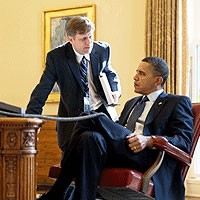Obama’s cancellation of meeting with Putin will not grow into trend – analysts

(Interfax – August 8, 2013) A number of political analysts interviewed by Interfax are of the view that U.S. President Barack Obama’s decision to cancel his one-on-one meeting with Russian President Vladimir Putin in September will not be followed by Washington’s skipping other forums hosted by Moscow, and the situation itself will be played down.
“In this situation, the matter is not even about Obama’s reverent gestures toward the House and Senate hawks but about the fact that the U.S. president could not meet with Putin in person. Russia could not fail to grant asylum to [former CIA employee Edward] Snowden, and Obama could not fail to cancel a bilateral meeting in this situation. That’s it. Both Moscow and Washington have saved face,” Fyodor Lukyanov, the chairman of the Foreign and Defense Policy Council Presidium, told Interfax on Thursday.
“Hence, if Snowden’s presence in Russia will not involve further steps, the score will be 1-1, so to speak, and then a break will be taken, after which the Russian-American dialogue will start gradually returning to its usual routine,” he said.
Obama’s demarche is related not so much to Snowden as to the general crisis of the present course of the reset in relations with Moscow.
“The problem is that the very agenda of relations between Russia and the United States is extremely limited now. And even if Obama arrived, I don’t know what he would talk about with Putin,” Lukyanov said.
Washington’s refusal to hold the bilateral meeting should be perceived as a solitary incident, which will not grow into a trend toward the systematic ignoring of international forums organized by Moscow, he said.
“I suppose there will be no more surprises if no new miracles happen to Snowden. If Snowden steps up his activities and Russia supports him in this, then the current situation may last longer. Washington’s position is a response to the existing circumstances. The Americans have chosen this very line of conduct by interpreting the purely coincidental Snowden story as political,” he said.
Obama’s decision not to meet with Putin will not lead to anything like the U.S. boycott of the 1980 Olympics in Moscow, which a number of other countries supported, Political Information Agency General Director Alexei Mukhin said.
“The Soviet Union hosted the Olympic Games without the Americans in 1980. Nevertheless, everything was just excellent. Even if Washington makes a similar step during the Sochi Olympics, this won’t mean anything unpleasant for Russia. In 1980, the Americans were supported by a number of countries, but now this can’t be replayed, because of the EU’s position, among other things,” Mukhin told Interfax.
It is unlikely that the Americans will undertake a series of countermoves in relation to other international forums in Russia, Mukhin said.
“It looks like, in its desire to sting the Russian leadership, Washington has outsmarted itself in the situation surrounding Snowden. The Barack Obama administration has behaved like a capricious woman, and Obama has become a hostage to the situation in which the Americans cannot move past the Snowden case. Will the Americans ignore meetings at other forums in Russia? This is unlikely, because a lot of them have quite important economic agendas,” he said.
It is more likely that the United States will soft-pedal the situation, particularly considering the position of those lobbying American projects in Russia, Mukhin said. “After these hysterics, the situation will be played down. The United States has just been too involved in this game. If the situation persists, the lobbyists of major American companies present in Russia will firmly say that their businesses should not be hampered,” he said.
